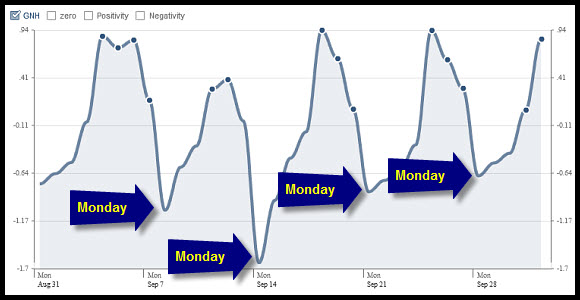 Facebook has released a “happiness index” based on the status updates people make on their site. They have an algorithm that looks for words connected with positive and negative feelings, and categorize the status updates accordingly.
Facebook has released a “happiness index” based on the status updates people make on their site. They have an algorithm that looks for words connected with positive and negative feelings, and categorize the status updates accordingly.
The GNH as it’s called, the Gross National Happiness index, currently only looks at status updates from US Facebook users, which makes sense since it’s a language-based study tool. (Hopefully Facebook will soon add similar indices for other countries as well.)
When you study the graphs that Facebook generates, a weekly pattern quickly becomes obvious. Unsurprisingly we’re at our happiest during public holidays and on Fridays and weekends, but a closer look at the graphs reveals what we’ve suspected for a long time:
People hate Mondays with a vengeance. (Garfield was right!)
Just look at these graphs.
Happiness level:

As you can see, the overall level of happiness bottoms out every Monday.
The low level of happiness on Mondays isn’t just caused by a lack of positivity. If we look at the negativity alone, it becomes clear that people are in a really negative mood on Mondays.
Negativity level:

People really do pick themselves up during the weekends, though, and we’re a lot happier on Fridays as well (anticipating the weekend, we presume?).
Positivity level:

We bet you can guess on which weekdays those drops in positivity take place… 😉
This “happiness index” clearly shows Facebook’s data mining potential. Considering its huge user base and active users, there are tons upon tons of data available, and the question is how Facebook will be using it. We’d love to see more of these “indices”. As long as the data is of a general nature there shouldn’t be any privacy concerns, so we’re all for this kind of information being made available.
Additional information about the GNH index can be found over at the Facebook blog. (Check it out, it’s an interesting read.)
Data source: All graphs are from Facebook’s United States Gross National Happiness page, with those elegant arrows added by us.



























